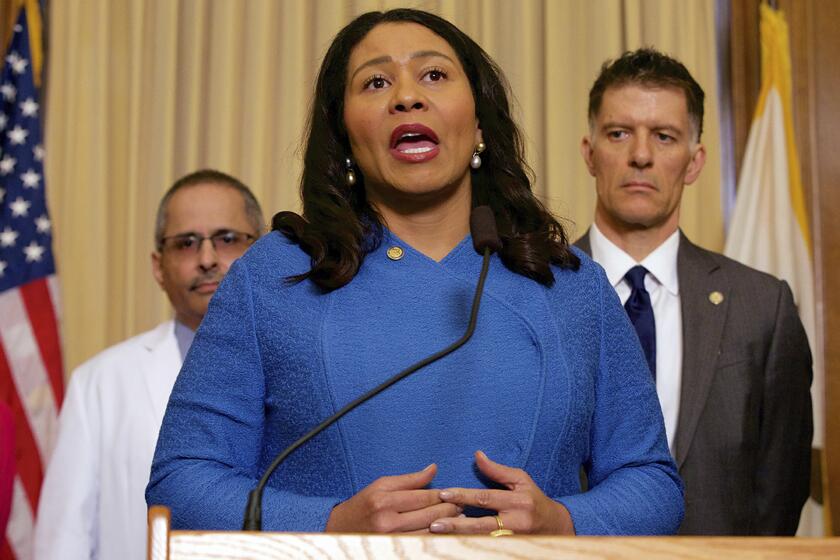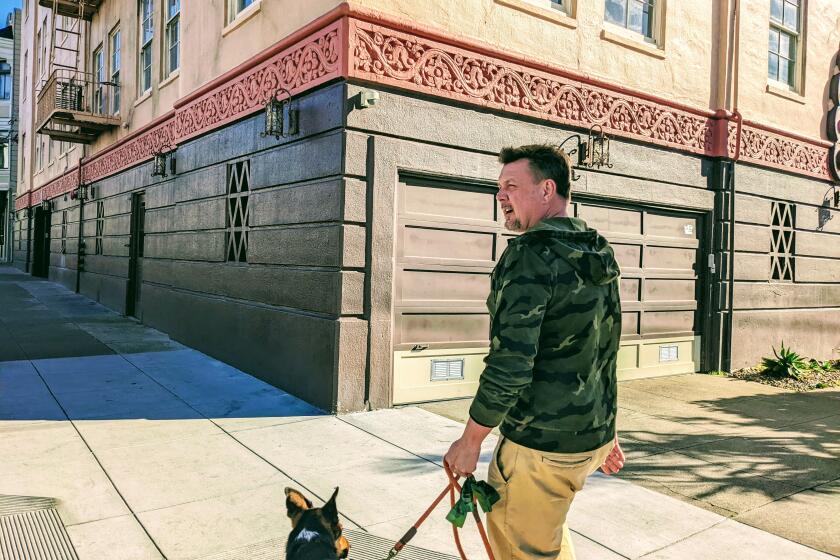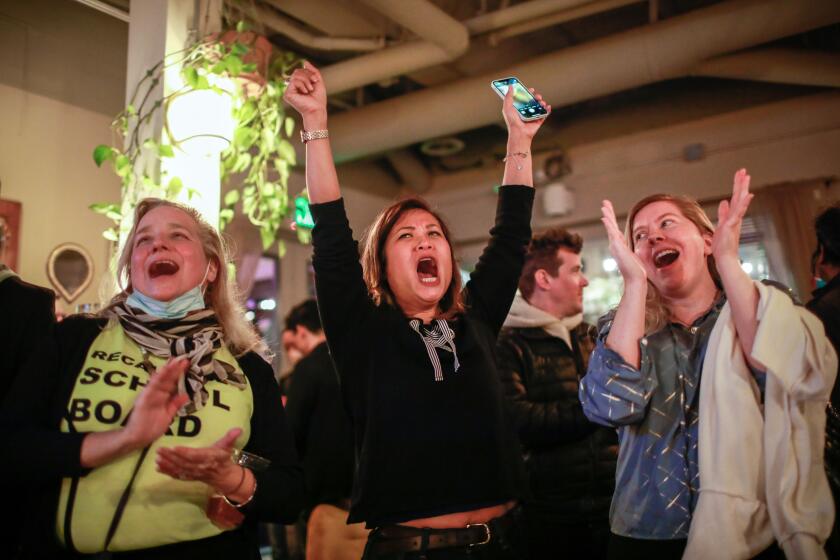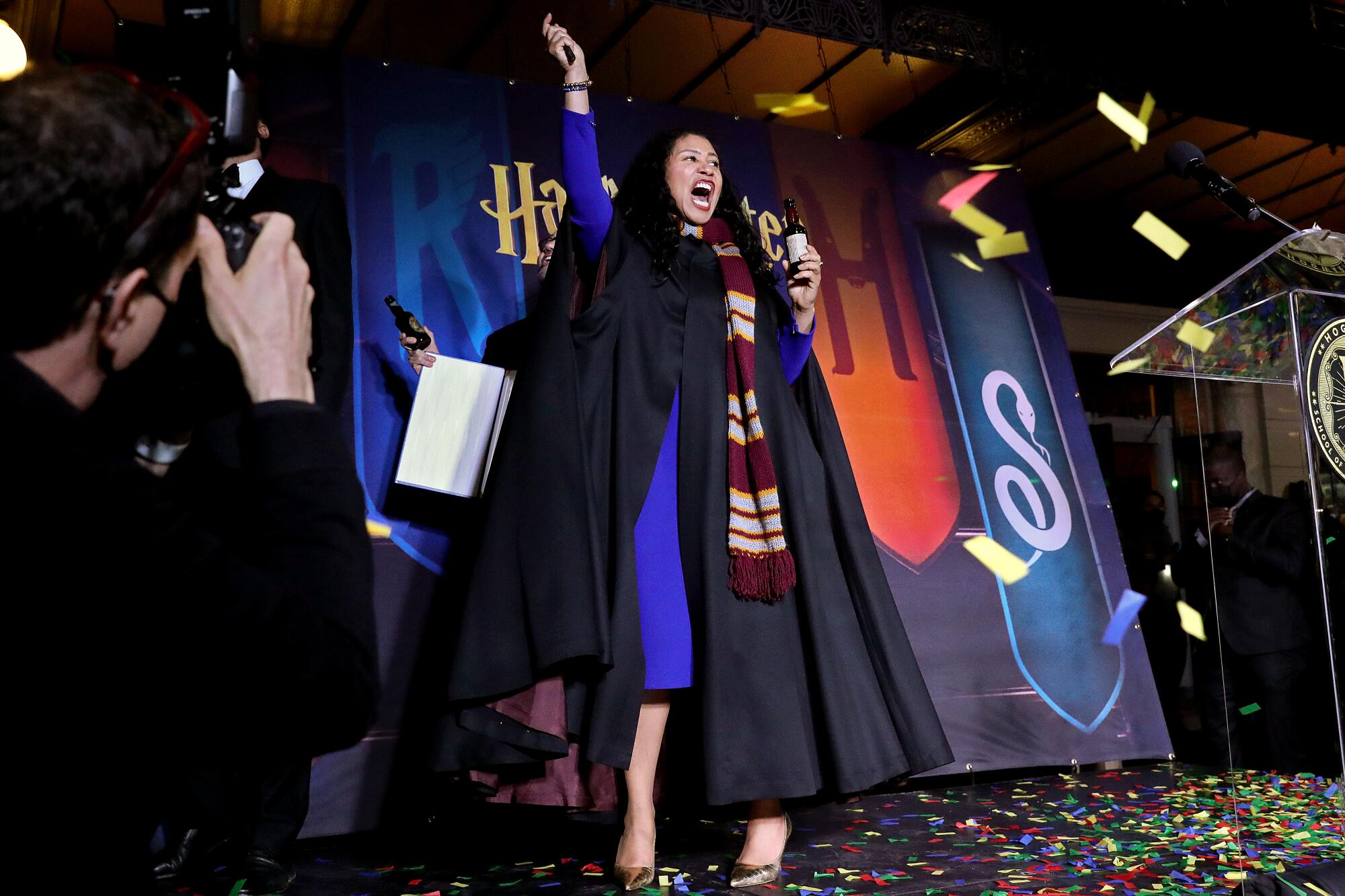
SAN FRANCISCO — When San Francisco Mayor London Breed arrived at UC Davis for her freshman year, she saw her new classmates surrounded by family. Except for the friend who dropped her off — her belongings in two small bags — she came alone.
Breed would frequently make her way back to the notoriously unsafe housing project in the city’s Western Addition where she was raised by her grandmother. She came not just to visit but often because of tragedy.
“When I was coming home, it was for the funeral of somebody I grew up with,” Breed said in an interview in San Francisco’s ornate Beaux-Arts City Hall. “And I just thought, what if he was here with me? I just imagined them walking around campus, and this could be their life. And that’s what got me involved in public service.”
Breed, 47, is a rising star in California politics because of her stewardship of San Francisco during the pandemic, as well as her efforts to tackle crime, homelessness, addiction and education in a city that is famously — if not always accurately — known for its liberal, live-and-let-live ethos.
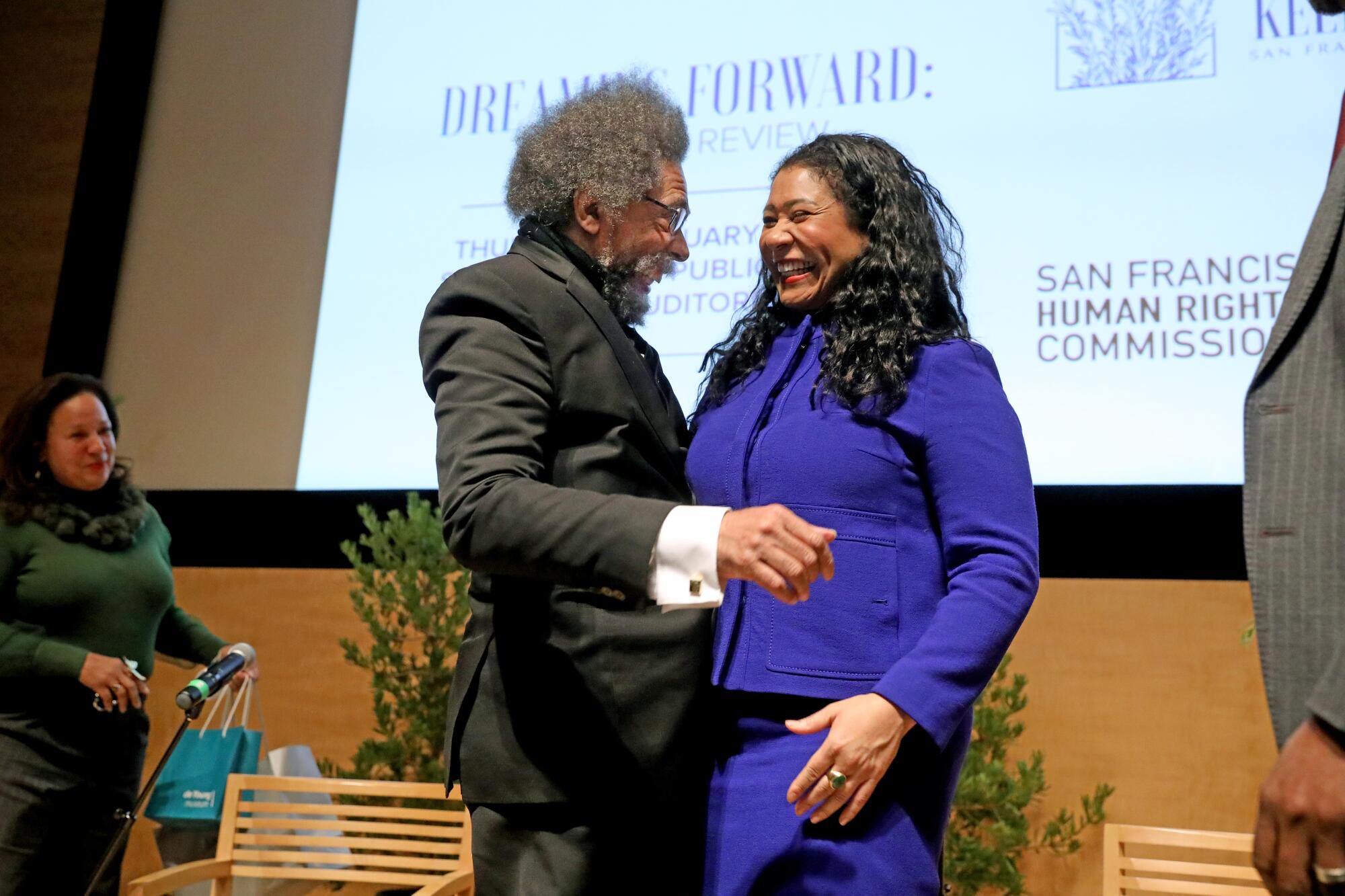
Up for reelection in 2023, Breed received national attention when she didn’t mince words as she declared a state of emergency in the Tenderloin district, beset by overdose deaths, open-air drug dealing, violence and homeless encampments.
“It’s time that the reign of criminals who are destroying our city, it is time for it to come to an end. And it comes to an end when we take the steps to be more aggressive with law enforcement. More aggressive with the changes in our policies. And less tolerant of all the bull— that has destroyed our city,” she said in December.
In a break with liberals who have called for defunding law enforcement, Breed’s emergency declaration allowed her to quickly increase police budgets and bypass city bureaucracy to ramp up services to addicts and mentally ill people who are living on the streets. (About one out of every 100 residents of the city is homeless, according to data from the federal government.) The declaration just expired, and some question whether it had a tangible impact.
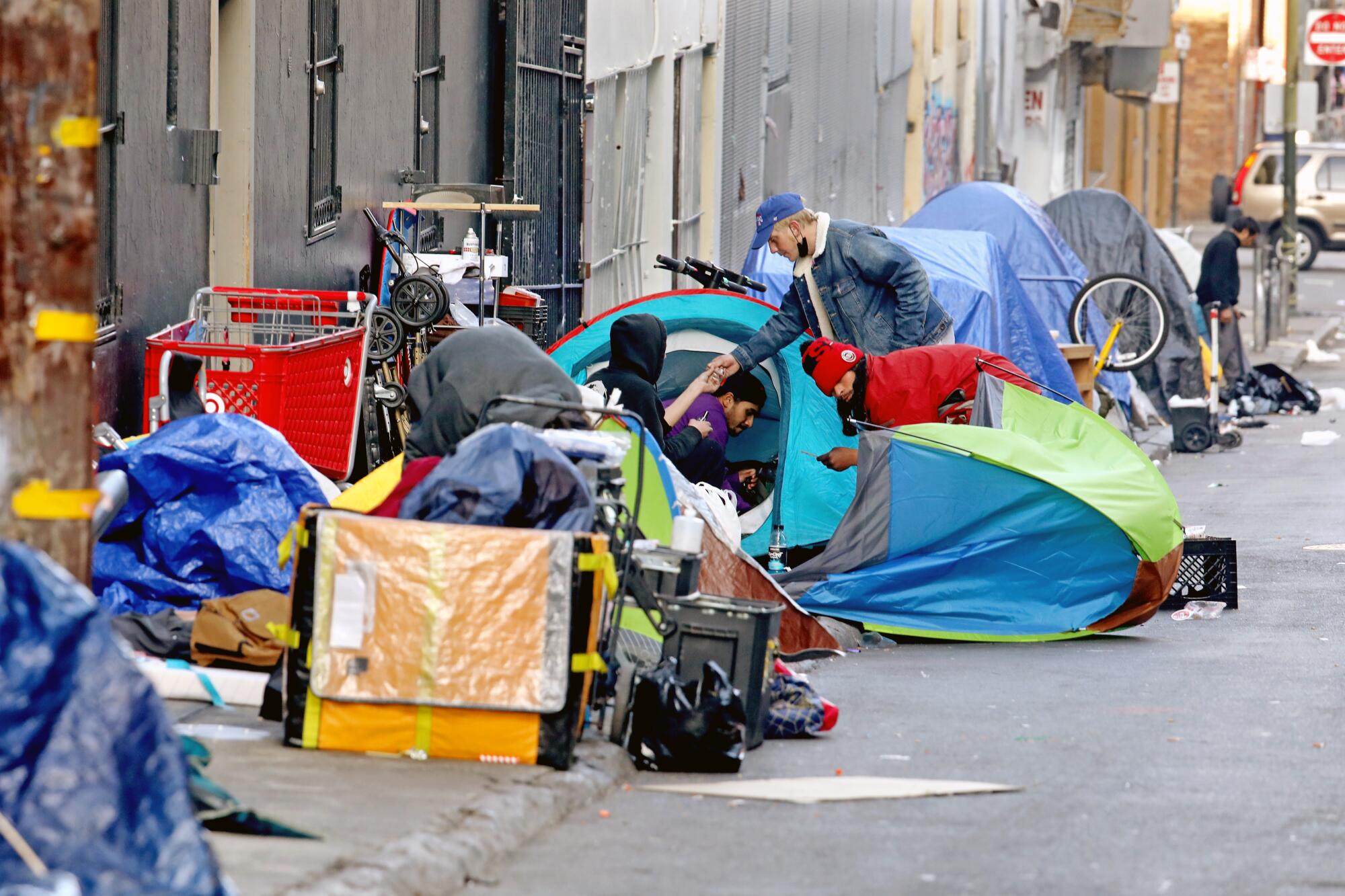
Regardless, Breed’s approach drew praise at a pivotal moment for San Francisco, which was already struggling with gaping inequality between tech millionaires and working class residents before the pandemic exacerbated the divide and also destroyed tourism in a city that is dependent on visitors from around the globe.
“I can’t help but take risks in order to transform lives so that the experiences that I had growing up doesn’t happen to the next generation.”
— London Breed, mayor of San Francisco
After a series of smash-and-grab robberies late last year at luxury stores in San Francisco and other cities in California, police presence in Union Square noticeably increased. An armed guard stands sentry at the entrance of a Louis Vuitton store that was looted, and Macy’s glass storefront remains partly covered with plywood.
“She’s giving voice to something happening in a lot of progressive cities right now,” said Sean Clegg, a Democratic strategist who lived in San Francisco for much of the last three decades and is working on businessman Rick Caruso’s mayoral campaign in Los Angeles. “She’s capturing the mood of the moment.”
San Francisco Mayor London Breed has been criticized for some of her decisions. But her early action on the coronavirus pandemic is also earning her praise.
But Breed’s efforts have also been faulted by some Democrats who argue she is falling back on failed policies that place the interests of the well-connected above those of the marginalized.
Kaylah Williams, the immediate past president of the city’s Harvey Milk LGBTQ Democratic Club, pointed to Breed’s opposition to several ballot measures, including a successful 2018 proposition that raised taxes on the city’s largest companies to fund more services for homeless people.
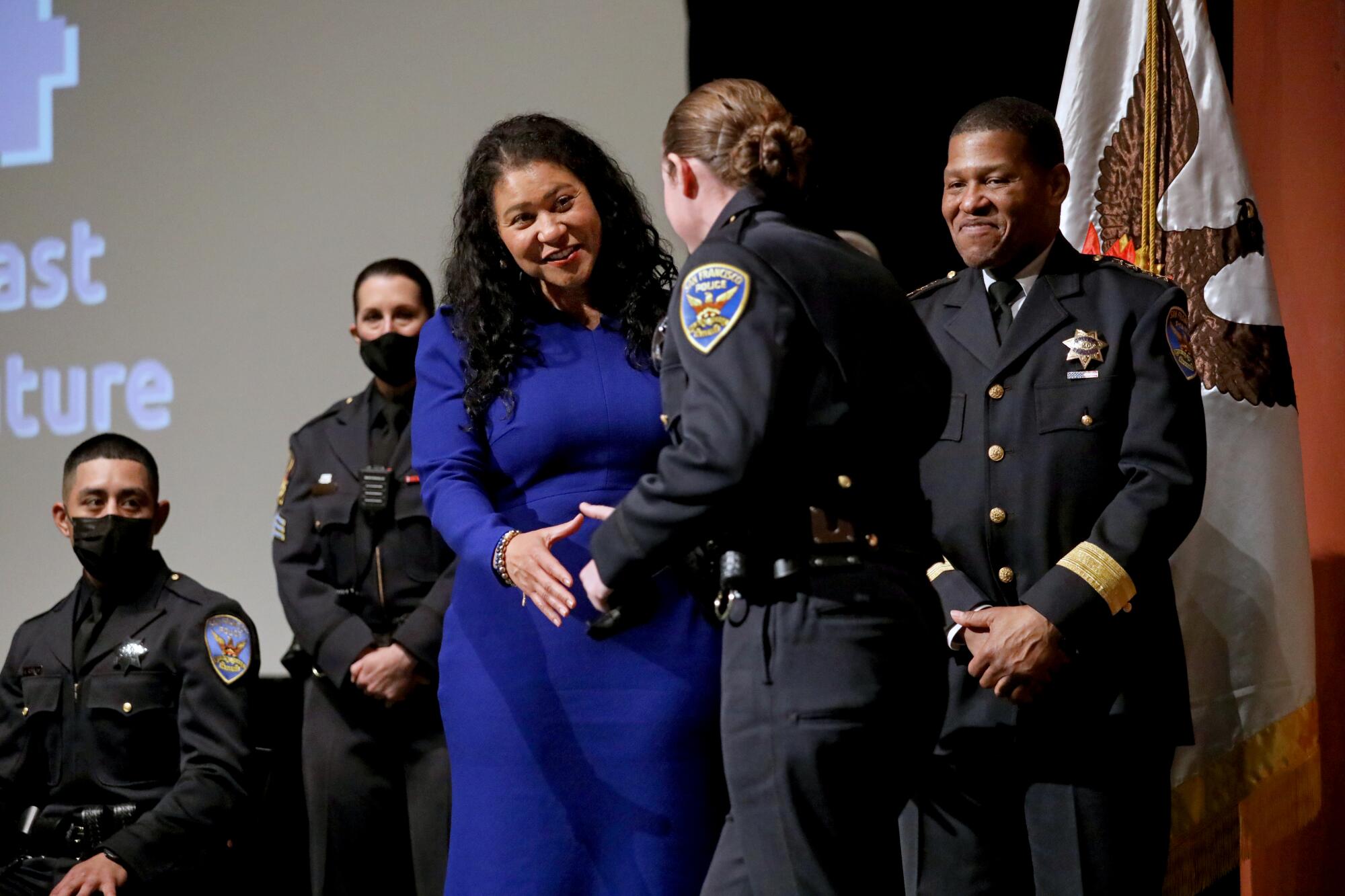
“We see time and time again, a lot of corporations and corporate interests put ahead of the interests of working-class San Franciscans,” said Williams, who was the campaign manager for city Dist. Atty. Chesa Boudin.
Breed has repeatedly said that she is “unapologetic” and has rebuked white progressives such as Boudin — who is facing a June recall — as not understanding what it is like to be poor and a minority in San Francisco.
“I can’t help but take risks in order to transform lives so that the experiences that I had growing up doesn’t happen to the next generation,” Breed said recently, speaking at a celebration of a $120-million two-year campaign she created that transferred money from law enforcement budgets to programs aimed at bolstering the city’s Black residents.
Later that day, Breed waved a wand at the reopening of the “Harry Potter and the Cursed Child” play at the historic Curran Theater, which had been shuttered for nearly two years because of COVID.
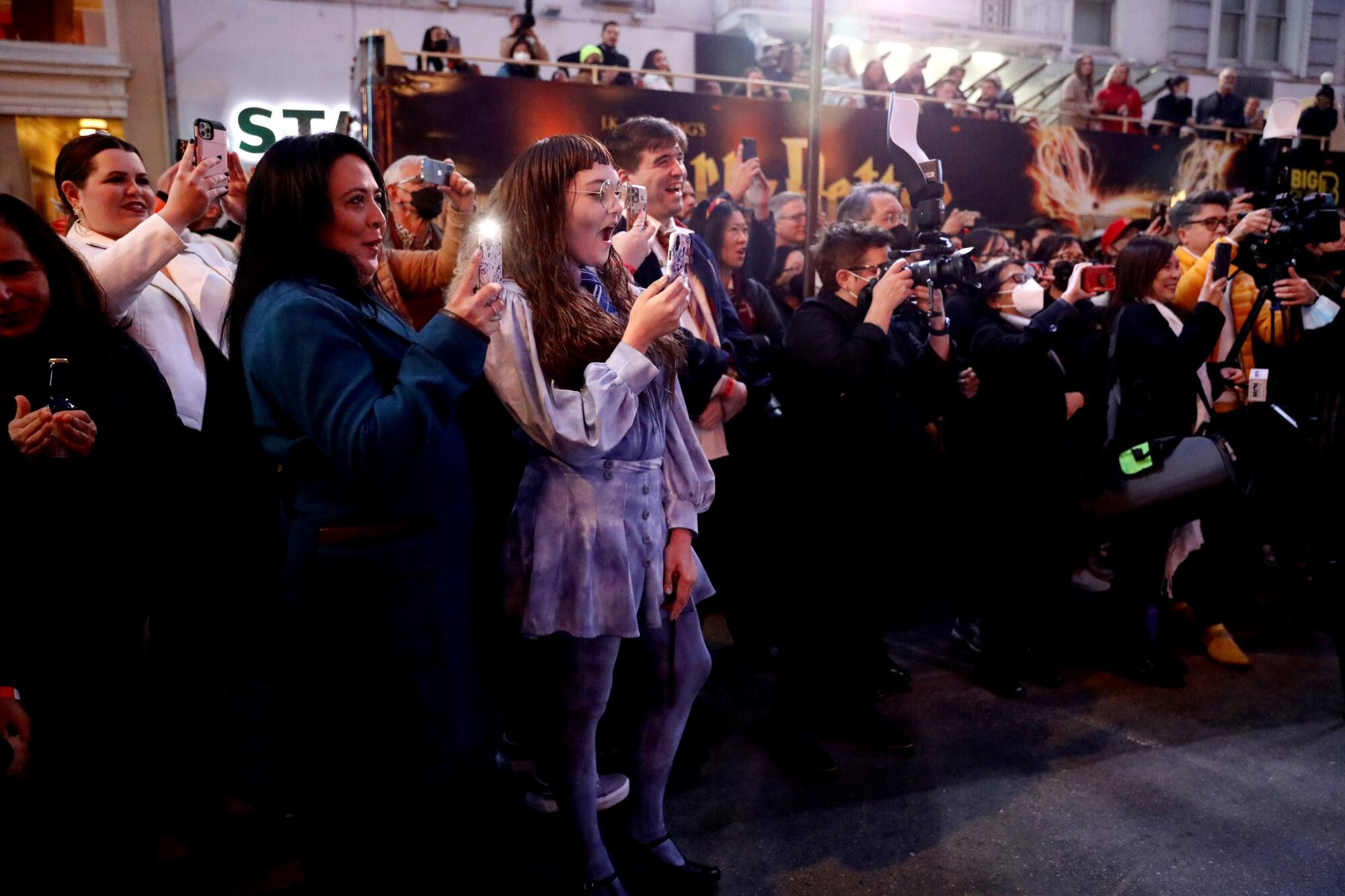
“This is really icing on the cake as we start to reopen our city and recover from this pandemic,” she told costumed Harry Potter fans, before cannons shot confetti in the air and celebrants clinked bottles of Butter Beer.
Such moments — including a cameo in a “Matrix” film that was shot in the city and write-ups in Vogue — were unthinkable when she was younger.
::
Breed said her experiences as a child and young woman ground her approach to governance.
She was raised in a roach-infested housing project so dangerous it was called “Outta Control Projects” — or OC.
She never knew her father and her mother was largely absent. A younger sister died of a drug overdose; a brother is imprisoned. A cousin was shot and killed by police. She witnessed her first homicide when she was 12. The men in her family were pimps, hustlers and drug dealers, Breed said.
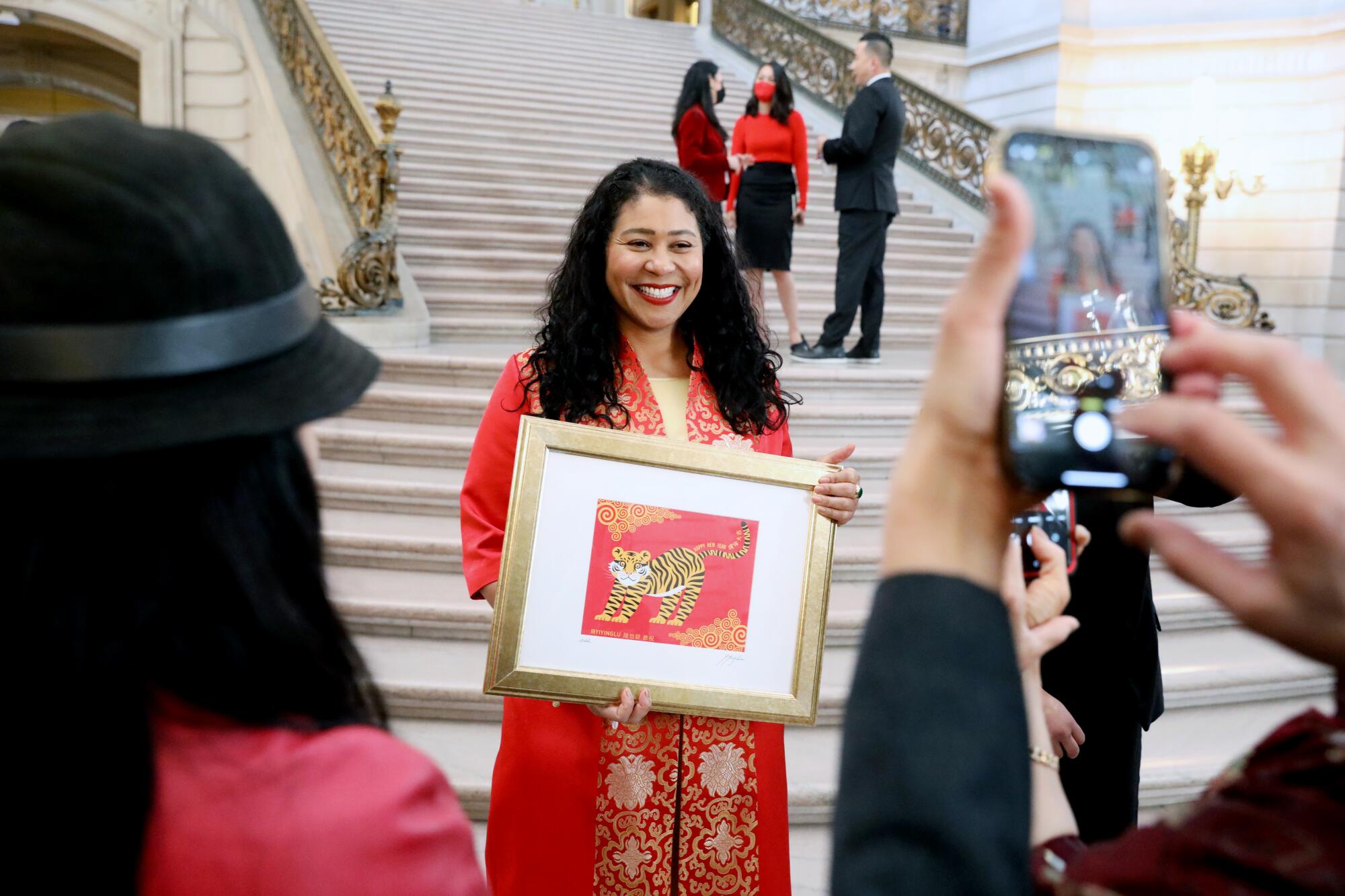
“I just know that we were poor, and it was hard. And there were times where I wanted to go out there and sell drugs and do illegal things in order to have money, and fortunately I didn’t,” Breed said in her office, surrounded by pictures of herself with Democratic luminaries, awards and a desk plaque that reads “What Would Beyonce Do?”
“And I’m glad I didn’t and I’m glad that I’m in a place that could help empower other people so that they don’t feel that they have to choose a path of doing something that can land them dead or in jail or on drugs.”
Unlike its counterparts nationwide, homicides barely rose in San Francisco, but thefts and break-ins have surged.
She and her neighbors were too afraid to speak to police after witnessing officers beat suspects and commit other crimes. But she also remembers the compassion officers showed her aunt, who was developmentally disabled and acted out — experiences that shaped her view of law enforcement as both necessary and needing reform.
“It’s a real balance of making sure that people in communities like I grew up in also feel safe and able to communicate and work with police,” Breed said.
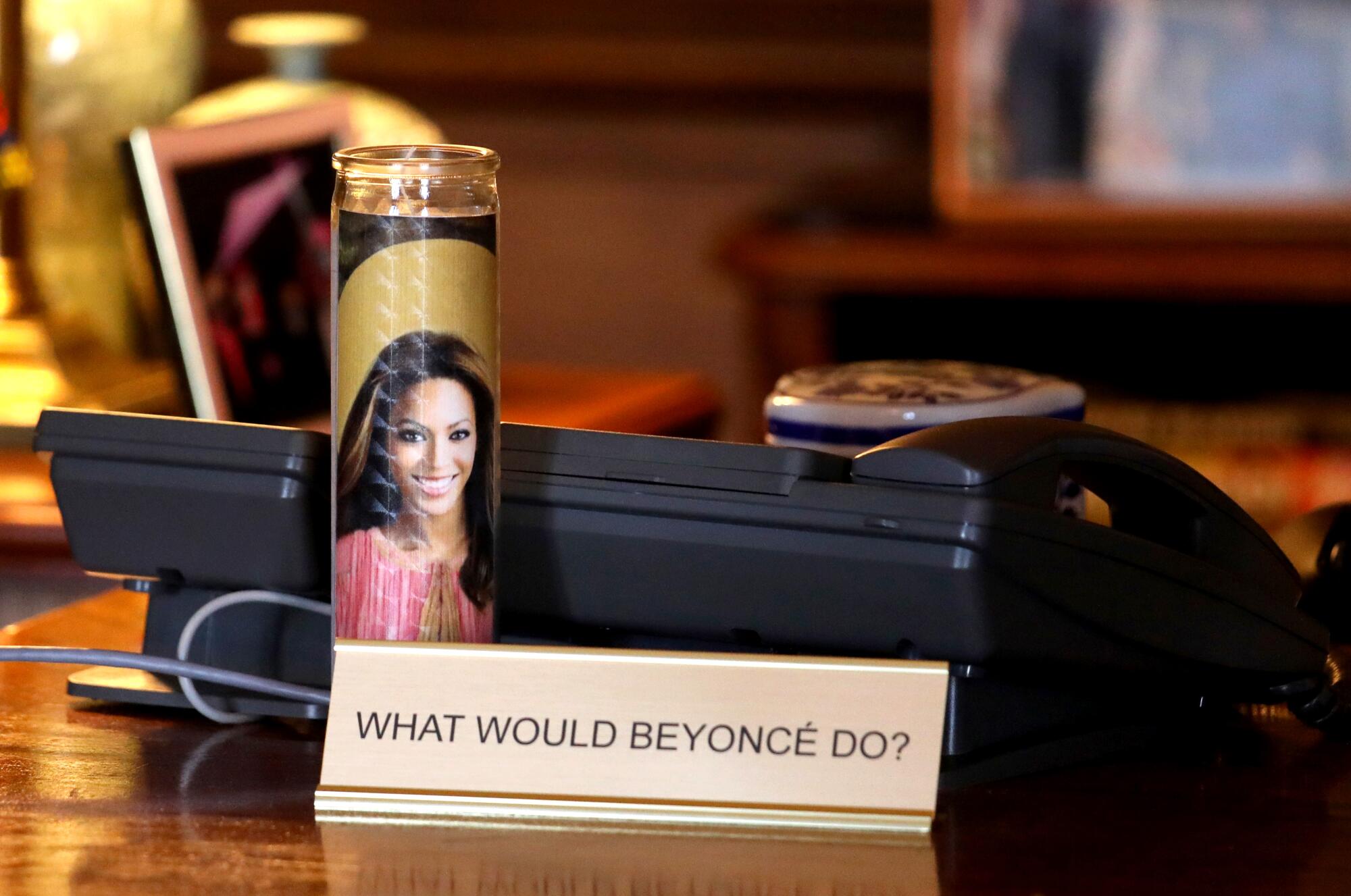
She attributes her success largely to the women in her life — her grandmother and members of the community who guided her, helping her write college application essays and providing an outlet that led her to stay out of trouble. “It was just so many people, and it was constant,” Breed said.
As part of a city summer program for low-income youth, Breed worked at the Family School starting at age 14. Some employees didn’t want to work with Breed because she was “rambunctious,” so then-administrative assistant Minyon McGriff had the teen assist her in the office.
“She was always a bright, funny, smart kid. She just grew up hard because she grew up in the projects. She was rough around the edges,” said McGriff, 60. “Simple stuff — how to dress, appropriate behavior, basic etiquette — those are a lot of the things she got from us.”
Breed’s experience at the Family School prompted her to create a program in 2018 that offers a paid summer internship to any working-age student in San Francisco who wants one.
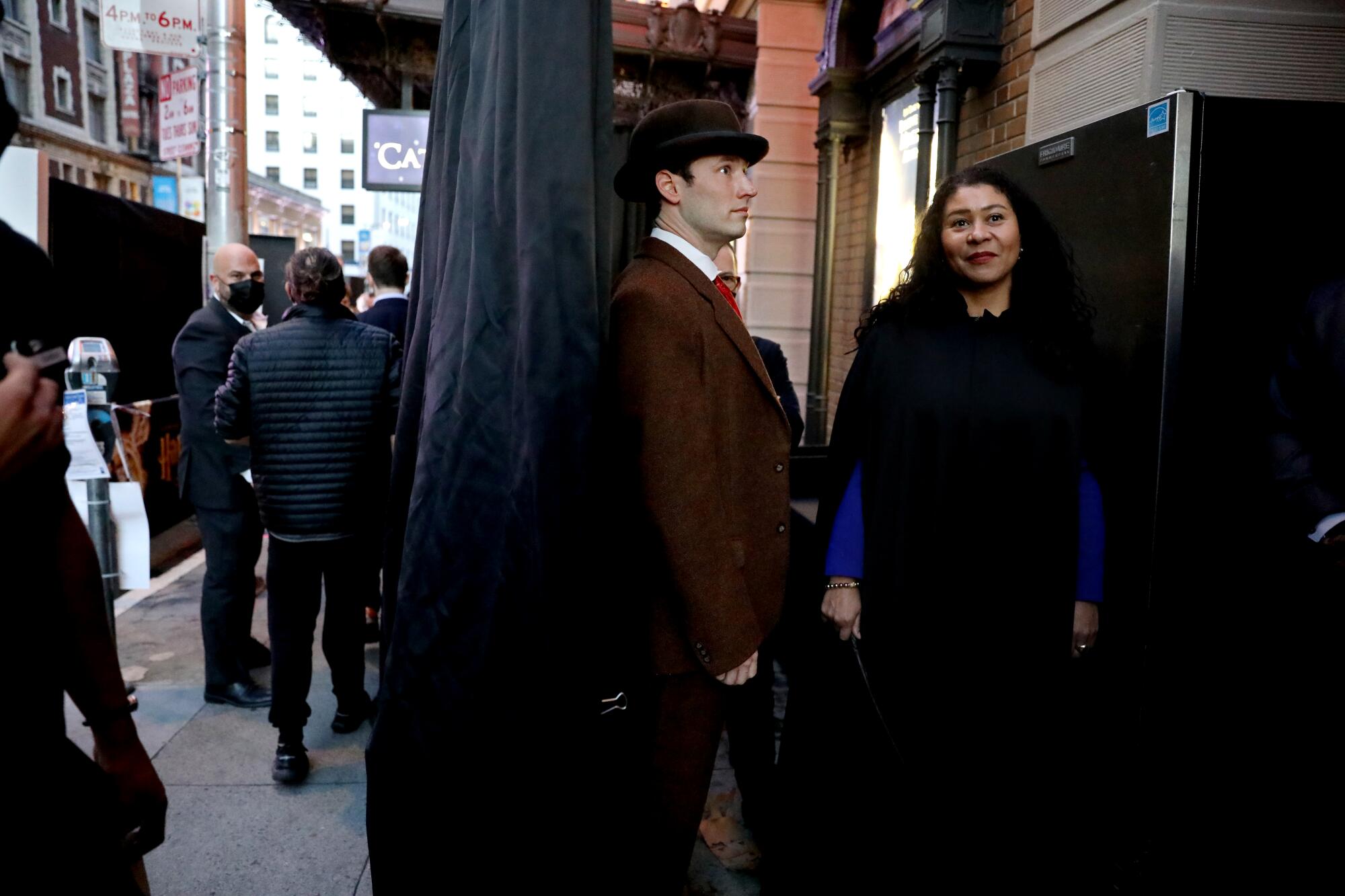
Such relationships, as well as her sorrow that friends she grew up with could not experience what she did at UC Davis, prompted Breed’s first foray into public service — registering voters for the NAACP while in college. After she graduated, she worked on Willie Brown’s 1999 mayoral campaign and served as executive director of the African American Art & Culture Complex and on several other city entities before winning a seat in 2012 on the San Francisco Board of Supervisors.
She has been dogged by claims that she was a puppet of the machine run by Brown — a legendary force in the city and state’s politics — as well as business leaders, wealthy donors and other power brokers who have long controlled San Francisco politics.
She has repeatedly lashed out at such allegations.
“So why do women have to be a pawn for somebody?” Breed told the Fog City Journal during her 2012 campaign. “Willie Brown didn’t wipe my ass when I was a baby — my grandmother took care of me.”
Brown declined an interview request.
Even some who disagree with Breed’s policies don’t believe she is making decisions based on who supports her.
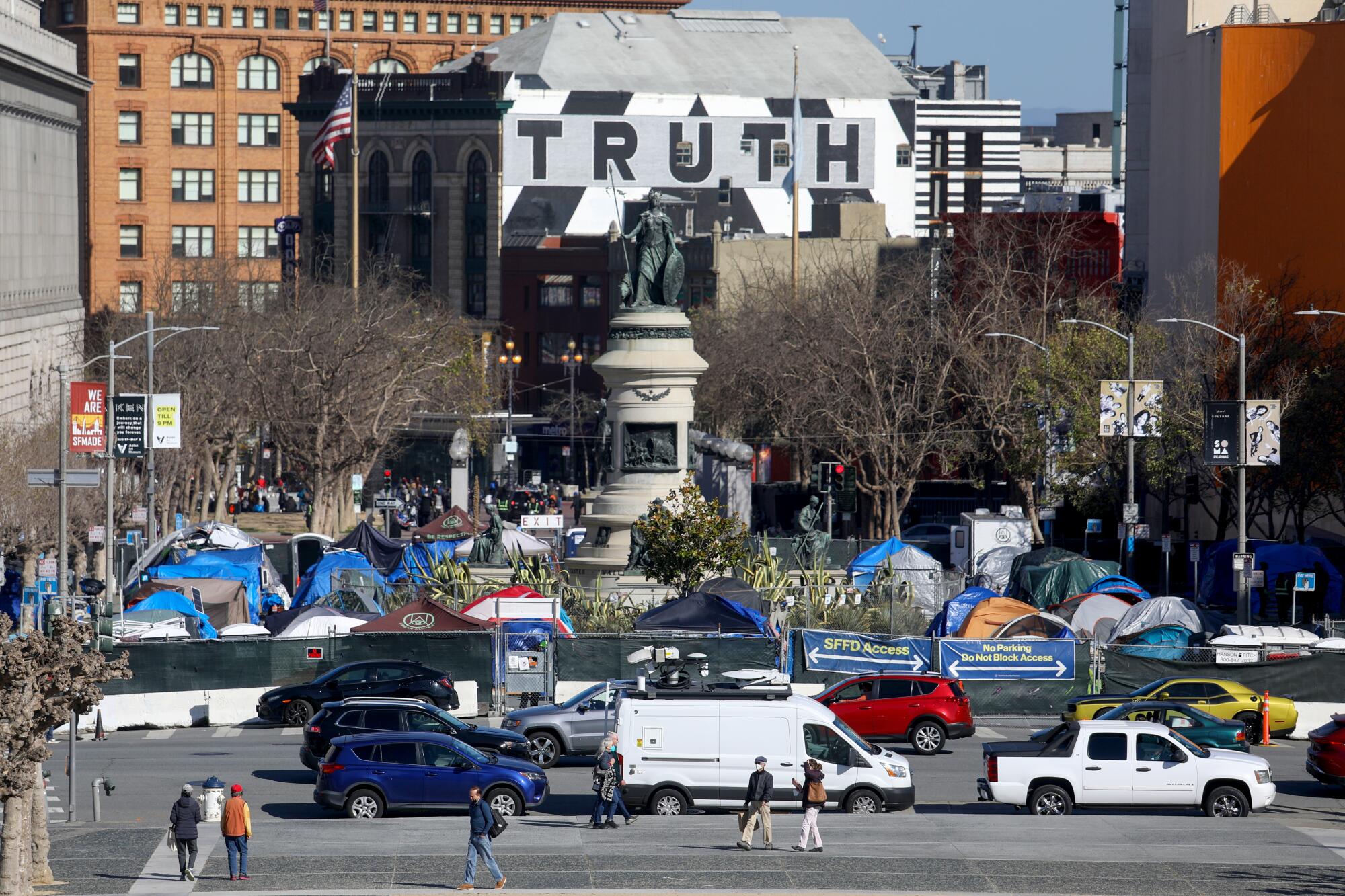
“She does truly love San Francisco and she is genuinely committed to a vision of a safer city,” said Jane Kim, who served with Breed on the Board of Supervisors and unsuccessfully ran against her for mayor in 2018. “It’s just that her analysis lands her on the same side with developers and downtown interests.”
Breed was president of the Board of Supervisors when Mayor Ed Lee died in 2017, briefly making her the city’s acting mayor.
She won the special election in 2018 to fill Lee’s term, becoming the city’s first Black female mayor. She promised to prioritize quality-of-life issues and, foreshadowing some of the struggles that would come, she pledged to fight a status quo that she argued had paralyzed the city.
“The politics of ‘no’ has plagued our city for far too long — ‘not on my block, not in my backyard,’” she said.
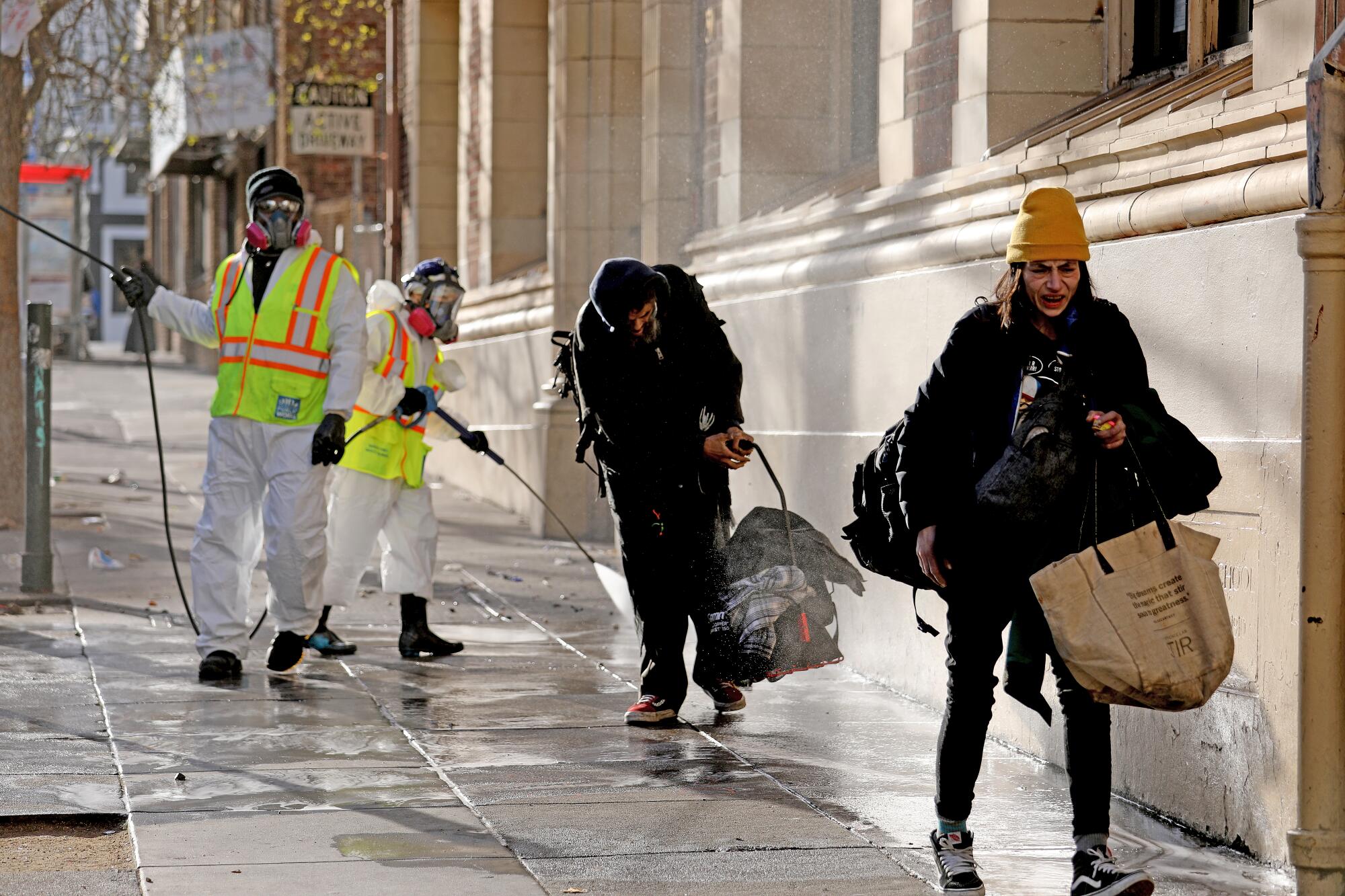
Political observers say Breed’s tenure got off to an uneven start as she sought to navigate the divide that has typically bedeviled the relationship between the city’s moderate mayors and the more liberal Board of Supervisors.
Once the pandemic hit, Breed was lauded by friends and foes alike for her leadership. San Francisco, with a population of about 874,000, was among the first cities to lock down, and had the lowest per capita death rate of the nation’s largest cities as of December. Three city school board members were recently recalled — ousters Breed backed — for prioritizing the renaming of schools over the reopening of in-person classes and an attempt to end merit-based admissions at a prestigious high school.
The overwhelming vote to recall three San Francisco school members was a forceful show of parents’ frustration with local circumstances. But the proponents think other politicians should take heed of families’ fury over long school closures due to COVID-19.
Breed has made missteps. She was fined for using her title as she urged then-Gov. Jerry Brown to commute her brother’s prison sentence, for accepting $5,600 in car repairs from the head of San Francisco’s public works department (a former boyfriend) who has since pleaded guilty in a federal corruption case, and for soliciting and accepting donations that exceeded campaign finance limits to help fund a float in the city’s Pride parade.
Like other elected officials, Breed has also received flack for repeatedly being pictured not wearing a mask. When caught dining with several people at the exclusive French Laundry restaurant, she initially acknowledged that she needed to set a better example. But she also blames social media and the press for obsessing over moments she did not wear a mask while eating, drinking or taking a picture.
Breed has been accused of viewing the checks and balances between the legislative and executive branches of government as obstructionism.
“It’s her constant lack of respect for the important role that the Board of Supervisors plays in the life of San Francisco residents, our constituents and their viewpoints that is often disturbing,” said Supervisor Aaron Peskin.
The infighting and lack of trust between the mayor and the board — a perennial of San Francisco politics — have stymied major progress on some of the city’s most intractable problems, but San Francisco State University political science professor Jason McDaniel said voters do not appear to be blaming Breed.
“Historically when we look at mayors, they are the ones held responsible by voters for the cost of housing, the condition of schools, the issue of crime. So far, she has managed not to be the focus of voters’ attention,” he said. “Whether that changes over time is a key question going forward.”
Jim Ross, a veteran San Francisco Democratic strategist, argued that moves that separate Breed from the more liberal elements of the city could be smart politics for an ambitious elected official in a city that served as a springboard for Gov. Gavin Newsom, Sen. Dianne Feinstein and Vice President Kamala Harris.
San Francisco has been described as “47 square miles surrounded by reality,” Ross said. “The real question is how does her image project in the reality that’s outside of San Francisco?”
Breed demurs when asked whether she plans to seek for higher office.
“I would never rule that out,” she said. “Because I didn’t think I would run for mayor and here I am.”
More to Read
Get the L.A. Times Politics newsletter
Deeply reported insights into legislation, politics and policy from Sacramento, Washington and beyond. In your inbox three times per week.
You may occasionally receive promotional content from the Los Angeles Times.

